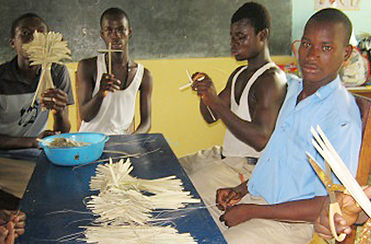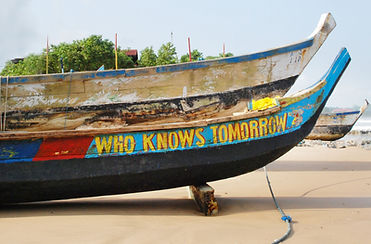
FRIENDS of AHOTO
(PPRC) CIO
Current Projects
The Friends currently support following projects

Childcare
We have a small Child Sponsorship scheme. Regular donors commit to supporting the children that Ahotokurom works with. Some of the children actually live in the residential care centre, others are supported on an outreach basis, with Ahotokurom ensuring the children are loved, fed, have medical care where necessary and receive an education. Donors pay £150/£180 per annum to support a child.

IT Centre
This centre opened in 2012 at Enyindakurom. Primarily funded by two key donors in the UK, there are 4 computers and 1 staff member. The centre offers IT training to the young people. IT is taught in schools without access to even one computer! Learning from a book is one thing but to be able to touch a keyboard, create documents etc. ensures that our children have a head start in the job market. This is especially important for those with disabilities who will not be able to undertake hard manual work. The harsh environment and electricity surges mean that computers have to be carefully looked after and supervised. Even with the highest standards they inevitable need replacing more frequently than here in the UK!

Special Needs School / Assessment Unit
The Special Needs Unit supports children and young adults who are physically or mentally challenged. Disabilities include cerebral palsy, down syndrome, autism, other severe mental challenges and brain damage due to cerebral malaria and many other undiagnosed challenges. Children have various stages of mobility.
A team made up of trainers, carers and assistants are involved with the development of the children, each having an individual learning plan. Children are closely monitored, e.g. with respect to eating, toileting, coordination etc. In 2014 Holy Cross Church in Catford adopted the Special Needs School – in particular the youngsters in the assessment unit for an initial period of 4 years. Funds are raised to enable teaching and support staff to be employed, to support training needs of staff and provide essential equipment to aid learning.

Training Centre through the sale of Palm Crosses
Each year a number of parishes in the UK order their palm crosses from Ahotokurom. These used to be made by the disabled, elderly residents. However, many have died and their skills have been passed on to the young, disabled people who have left school but are not quite able to gain mainstream employment. The funds raised go to support the work of the Training Centre in offering sheltered employment to the youth.

General Fund
It is not part of our mission to provide core funding to keep the centre running but to support funds for additional projects or needs including the everyday unforeseen challenges that are presented when people live in poverty. Donors can just make a donation to the general fund which is used for a wide variety of needs. Some uses of the general fund have been:
-
Medical emergencies such as treatment for a broken arm or severe malaria
-
Families in need when a new born child arrives
-
Unforeseen problems with one of the centres vehicles
-
Presents to ensure every resident has one gift on Christmas day
-
Even a coffin to bury one of the residents
No one can predict what the need will be. It is important that there is a cushion there to help

Rainham Scholarship Scheme
The young people cared for by Ahotokurom do not have connections and family members in business so education is key to ensuring that the young people can get work. For over 5 years the people of Rainham parish have supported a Scholarship scheme to Vocational Schools. Young people have graduated as plumbers, electricians, mechanics, carpenters, secretaries, cooks and nurses. This has enabled them to gain employment, become independent and many cases support their families.
For example:
Victoria trained as a cook. When she graduated she taught her family to make soya bean kebabs and helped them set up a small scale business. Her disabled mother and her sisters made the kebabs, then her sisters would walk from village to village selling them. This enabled a basic income for the family.
Kadisah trained in healthcare and then went on to become a nurse. With her wages she bought a fridge (the first in the village) and her parents (disabled through leprosy) were able to sit at home and sell ice water from their balcony. She then established a little kiosk outside the family home
Solomon and his mother suffered leprosy. Sadly his father died in an accident whilst they were both in hospital for treatment. His mother then died as a reaction to the treatment. Solomon was orphaned. Childcare became his home and supported him through secondary school and he then gained a place on a car mechanic course.He graduated recently and is now on national service with Ghana Water and Sewage authority (every Ghanaian who completes education has to work for a company for a year on national service). He hopes after a year he will be employed by them and be able to become independent of childcare. In the meantime he helps out at Ahotokurom driving for the Sisters and residents of the centre